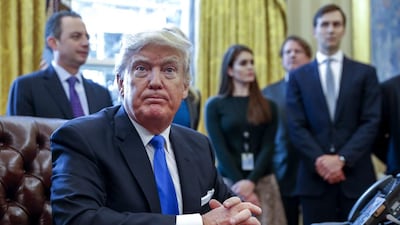We do not yet know if Donald Trump will prove to be a good president, but the “Great Man” theory of history began to apply to America’s 45th commander-in-chief from the minute he took office.
That’s not just because he became head of the richest, most militarily powerful country in the world. The “Great Man” theory applies to unusual individuals whose character, inclinations and behaviour affect the course of history for good or bad.
Certain individuals have an undeniable place on that list. Even the most casual rundown of the “great men” of the 20th century would have to include, in no particular order, Kemal Ataturk, Mahatma Gandhi, Mohammed Ali Jinnah, Winston Churchill, Josef Stalin, Adolf Hitler, Mikhail Gorbachev, Franklin Delano Roosevelt, Martin Luther King, Charles de Gaulle, Mao Zedong, Osama bin Laden and Nelson Mandela. Oh, and FW de Klerk, South Africa’s last white president, who had both the wisdom and the courage to hand power to his former enemies.
That list, of course, is subjective and incomplete. It only features political leaders or “great men” whose actions were politically significant and it leaves out unusual people in other fields such as the arts, technology, philanthropy and fashion. Bill Gates, Mother Teresa, George Orwell, John Keynes and Coco Chanel also changed the course of history in their own way. But for the purposes of world history, it is America’s president Trump who will make the list of “great men” rather than Albert Einstein.
Mr Trump, like the 20th-century leaders listed above, has a unique personality and an unusual way of thinking. Whether it is the Gaullist traits – nationalism, protectionism or anti-multilateralism – he shares with France’s Charles de Gaulle, the self-regarding and controlling instincts of Mao, Stalin and Hitler, or the reformist zeal of Ataturk, Mr Trump is not like most other American presidents. Or indeed like most other Americans. Or like most other people. It is all but certain that he will make history rather than simply manage it.
Are professional historians paying attention? Princeton history professor David Bell recently urged his tribe to show more interest in Mr Trump, the man, rather than just the social forces that brought him to power.
Populism, he says, may explain Mr Trump’s election victory, but it can’t forecast what will happen next on the watch of a man who is one of “a handful of unusual individuals, history’s archetypal Great Men and women”, people who cause historical change just as much as large-scale, long-term and impersonal forces.
It was an unusual plea from an academic who was trained in the French Annales School of historical thought, which sees social change developing across swaths of society rather than emanating from particular individuals.
One of Annales’ founders, Fernand Braudel, who wrote a massive account of the Mediterranean, believed that events were brief, nervous oscillations, the “froth” on the waves of time, and that decisions taken by powerful individuals were just insignificant “foam” on the ocean’s surface. Meanwhile, Braudel believed history took place at much greater depths and, like an iceberg, was hidden from view.
Is Mr Trump's rise just the foam of history, then, and its implications similarly meaningless?
Not if you consider Prof Bell’s confession that despite his training he ultimately found it “hard to teach the history of 20th-century Europe without often lapsing into the heroic mode – or rather into the mode of ‘heroes and villains’” .The character of the people who controlled states with massive destructive power became hugely significant, he says. This mattered particularly “in dictatorial states”.
Adolf Hitler and Joseph Stalin are the most obvious examples. What these men did was dictated by their characters and, insists Prof Bell, “the choices they made mattered”. Had different individuals been in power in Germany and the Soviet Union at the time, the course of history might have been different.
So too Churchill, who was pugnacious and prepared to fight Nazi Germany, unlike almost any other leading British politician of his time. So too Ataturk, Gandhi, Mandela, de Gaulle, FDR and the others on the preliminary list of “great men of history “.
Interestingly, the “Great Man” theory has its equivalent in journalism, which is often called the first draft of history. For journalists, it’s the "Big Personality” rule or the reliable expectation that some individuals will affect events by their idiosyncrasies.
For this year, three big personalities are expected to dominate – Mr Trump, Russia’s president Vladimir Putin and North Korea’s Kim Jong-un. All three have a distinctive mindset that can best be characterised as unpredictable and willing to play the wild card to achieve strategic aims.
For Mr Kim, it is his plans for an intercontinental ballistic missile. Mr Putin’s goal is to force renewed worldwide respect for Russia. And for Mr Trump, it is “America first”, the slogan he repeated at his inauguration as president last week and which may prompt him to remake the global order.
Call it the “Big Personality” rule or the “Great Man” theory, it is true, especially when a great man is not so good.
Rashmee Roshan Lall is a writer on world affairs
On Twitter: @rashmeerl


